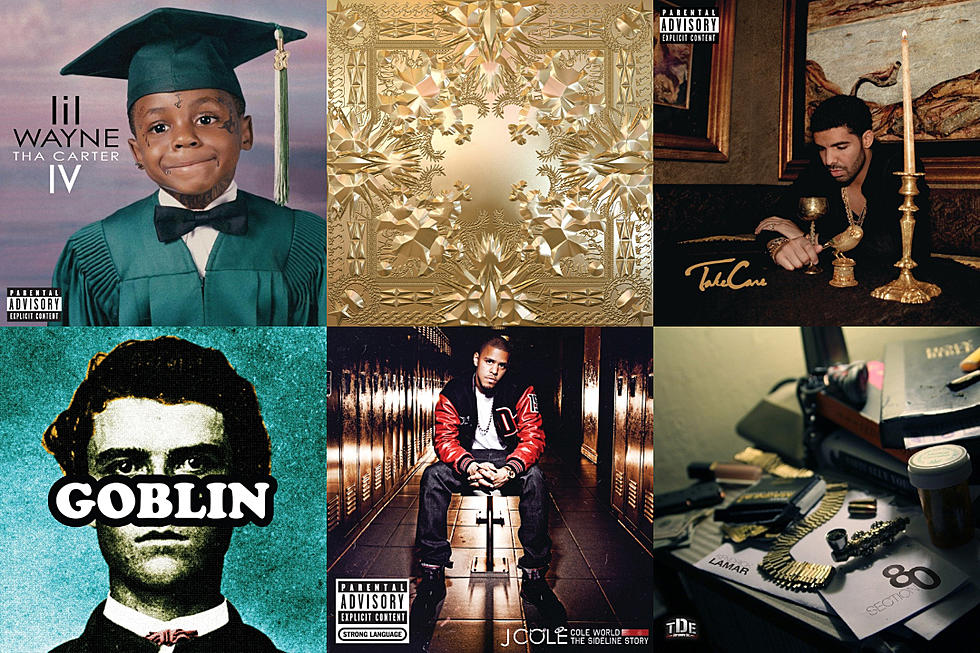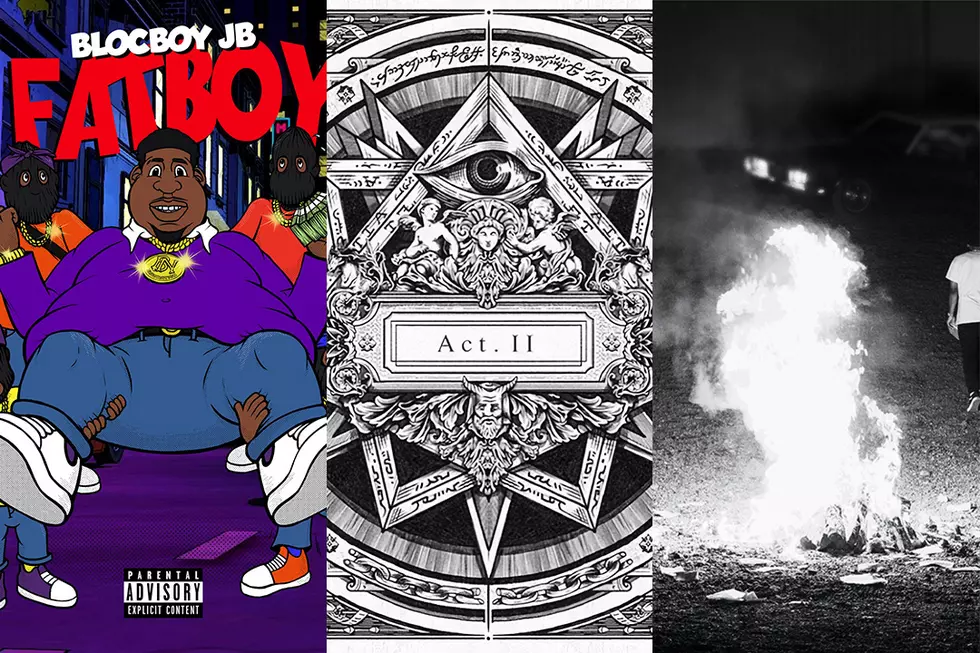
9th Wonder on New Beat Tape (Tutankhamen), Young Artists, and Goals in Academia
9th Wonder stands as one of the few hip-hop producers who can charge for an album made up entirely of instrumentals. After stacking critical acclaim with previous compilations like 2005’s Dream Merchant and 2011’s The Wonder Years, earlier this month, 9th unveiled Tutankhamen, a 40-track beat tape composed of his noted bangers and previously unreleased tracks. Since parting ways with Little Brother in 2007, The North Carolina beatsmith has been running his own indie label (It's A Wonderful World Music Group) and teaching courses on hip-hop history at Duke University and North Carolina Central University. XXL recently got up with the producer turned hip-hop scholar to discuss Tutankhamen, his favorite up-and-coming artists, and his plans to join Harvard’s Hip Hop Archive next fall. —Calvin Stovall (@CalvinStovall)
XXLMag.com: There aren’t many producers who can put out an instrumentals-only album and actually make money. How does it feel to be at that level?
9th Wonder: Before Dilla put out Donuts and stuff like that, Pete Rock put out Petestrumentals. That was one of the first beat tapes of its kind. He had a few songs on there, but it was mostly instrumentals. It’s only a few of us I think that can pull it off. But there’s definitely an undercurrent of people who love beats who can’t rhyme, or who rhyme in the shower or rhyme in the car. And that’s for those people. And then you have those people that think they can rap. You know what I mean? They put out mixtapes and this, that and the third and you go around and find plenty like, “I rapped over this Dilla beat, or I rapped over this 9th Wonder beat or this Madlib beat.” It’s only a select few of us that can actually do that, or that has the catalog of music to do that.
What were you trying to say with the title and the image of King Tut on the cover?
Eh, for me it’s never—we were just talking about this last night. How artists put out things and we’re supposed to think it’s this overall deep meaning behind it, and people come up with their own ideas. There really isn’t [a meaning]. When I started, I was going to put out a beat tape called Beattie Wheatstraw, and for some strange reason I just wanted to change it. I just wanted something more profound than that. So I always thought the name Tutankhamen was very profound. King Tut, with the exhibit and everything and the story behind it, I’ve always been enamored with that whole story.
When did you first learn about King Tut?
When I first started reading about him, [I was] 11, 12. Very young, and it wasn’t actually in school. It was rappers that I heard start talking about King Tut and Egypt and stuff like that. And I just got into it then and it just went from there. I just wanted to put something out—I know my label has been putting out records in rapid fire [speed], and now we’re selling records. So now we’re kind of testing the market to see where our fans really are. Everybody’s a fan ‘til it’s time to buy something.
And it’s not intended for one type of listener, right?
I just want people to enjoy the music. There are a lot of people who bought the tape who just don’t rap who just like to ride around and listen. I get that a lot from people. I get, “I could ride around and listen to your beats all day.” I make a lot of beats, and I have some people like, “Man, don’t let anybody rap over this I just need it as a beat.” I get that a lot. So that’s for those people, too. I think sometimes underground hip-hop, which I’m put in that box a lot, I think that audience is polarized to the point where you’re not supposed to enjoy it unless you’re in the underground. And a lot of people may not like “underground” or “backpack,” or whatever-the-hell-that’s-supposed-to-be music, but they do like beats. So that’s what’s most important. People from all walks of life can listen to beats, I had a couple of people hit me and say, “My mom was in here listening to your beats ‘cause they got soul in ‘em.”
As an elder statesman of the game and a teacher, what young talent has you most excited about the future of hip-hop right now?
(As far as) producers, that kid Rashaad that made all of the beats from Stalley’s Lincoln Way Nights, real big fan of him. Big Jerm from Mac Miller’s camp, real big fan of him as well. Oh, there’s this kid from Scotland named Jaisu, he’s dope. And then this other guy named D.R.U.G.S., he’s fire. Lord Jesus.
So are you constantly listening to new artists and looking for young talent?
I’m constantly [listening]. I have to because that’s what inspires me to keep going. When I first met Evil Dee, he said he heard The Listening, our first Little Brother album, and he said that inspired him to keep going. I look for cats to kind of pick the torch up and keep it moving from my side of things. From a rapper's standpoint outside of my team, the person that’s really catching my ear is Joey Bada$$. When he said [in an interview], “I don’t listen to the radio, literally I don’t know what’s on it”—just his whole mind frame of the game.
We had him up in the office recently. He's really smart. Very talented.
If it’s one of him, that means he has friends and there’s a whole legion and generation of kids that’s just like him that can not necessarily change the game, but bring a different sound to kids. That’s why I’m excited about Joey Bada$$. The fact that he can rap, yeah. The fact that he can actually change the course of time when it comes to hip-hop and when it comes to how young people see hip-hop and the sounds that they hear, and the types of beats that they hear and stuff. A lot of people think that young people don’t like that type of stuff. And that’s a lie. So he’s proving the naysayers wrong, that’s why I’m a big fan of his.
So you’re obviously optimistic about the future of hip-hop.
It’s an exciting thing to know and to see kids his age taking hip-hop and using it for something else. It inspired him to read a lot of stuff outside of school and inspired him to get more knowledgeable about things and he’s bringing that whole look back, the sound of it. When I first saw “Survival Tactics” the first thing I thought of was KMD. I was like, “What the hell?” And we all know that KMD turns into MF DOOM. Progressive Era, I’m telling you, man, it can change the course of time. If he’s 17, there’s no boundaries of how he can influence a 14-year-old. The same thing that Tribe and Public Enemy and Brand Nubian did for me as a 15-year-old, he can do the same thing to a 15-year-old. So if we can get about five, six more of him, we’re in the game!
You obviously have a real passion for the future of hip-hop. Do you plan to continue teaching its history at the University level?
Yeah, I teach at Duke and I’m also going to be at Harvard this fall. I’m going to be there in a fellows program at the Hip-Hop Archive in the same building that Henry Louis Gates is in. I can’t say what I’m [going to do] for a research project yet, but Kenneth Price is going to do a documentary on that. I can’t say too much about it, but that’s what it is and that’s what I’m doing. So I’m very excited about the opportunity.
What’s your ultimate goal with education?
I just want to make a straight transition into academia. I understand that performing in hip-hop has a timeline to it. Producers live longer than rappers, that’s for sure, but performing and this and that and the third has a timeline to it, and I just want to be able to extend the life expectancy of hip-hop past the stage and past records. I think the only way we’ll be able to extend the life expectancy of hip-hop is if we do it in the classroom—higher education is where we can solidify this thing and make it a part of history. And I want to be a part of that before somebody else becomes a part of it and teaches it the wrong way.
More From XXL









